An Enlightening Visit to a Recycling Station
By Ye Zi-hao (葉子豪)
Photos by Huang Hsiao-che (黃筱哲)
Abridged and translated by George Chen (陳纘強)
An Enlightening Visit to a Recycling Station
By Ye Zi-hao (葉子豪)
Photos by Huang Hsiao-che (黃筱哲)
Abridged and translated by George Chen (陳纘強)
In May 2016, The Wall Street Journal published an article entitled “Taiwan: The World's Geniuses of Garbage Disposal,” pointing out that Taiwan's recycling rate of 55% is significantly higher than the United States (at 35%), and that Taiwan's status as a world leader in recycling is on par with countries such as Germany and Austria. Yet, despite ranking among the best globally in environmental awareness and action, Taiwan still faces challenging environmental issues with increases in the import of global waste and the overall deterioration of the environment.
With efforts in environmental protection since three decades, Tzu Chi volunteers in Taiwan not only continue to devote themselves to recycling work and environmental education in their communities, but also share with people from all over the world practical ways to reduce waste and carbon footprint in daily life.
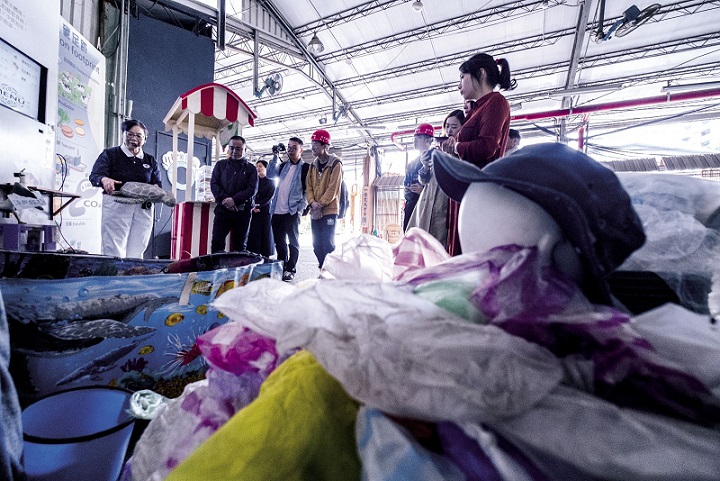
At Tzu Chi's recycling station in Taipei's Neihu District, a volunteer explains the problem of waste pollution to a visiting group. In 2018, nearly 400 groups, totaling more than 13,000 people, visited the recycling station.
How Much Carbon Footprint Does Your Breakfast Produce?
“We are so happy to see all of you visiting our recycling station. The fact that you are standing here means that you care about the Earth. Please come along with me!” Talking through a voice amplifier, Zheng Hua (鄭花), Tzu Chi volunteer and retired teacher, was about to share information on recycling and environmental protection to a group of entrepreneurs from China who are visiting Tzu Chi's recycling station and educational center in Neihu District, Taipei.
Before this group of entrepreneurs arrived, the recycling station in Neihu has already received in the same month Tzu Chi's recycling volunteers from Quanzhou Province in China, school principals from Dallas in the U.S. as well as teachers and students from an elementary school in Singapore. Offering 300 tours year-round at the recycling station, Tzu Chi volunteers from Neihu are not only good at recycling work, but are experienced in sharing and explaining about environmental protection.
Zheng Hua lead the entrepreneurs to the first stop of the tour—a pretend breakfast stand. She went behind the stand and asked a visitor: “What would you like to have for your breakfast today?” “A Chinese bun!” “Would you like a meat bun or a vegetarian one?” From a display window, Zheng took out several food models and scanned the bar codes on them to display the carbon footprint that each item produces. A vegetarian bun produces 0.1 kilograms of carbon emissions compared to 4.5 kilograms of a beef burger. This stark contrast clearly shows that a vegetarian diet is better for the environment than a meat-based one.
"In Taiwan, a person uses an average of 2.7 plastic bags per day, which sums up to over 900 plastic bags per person in one year." At the second stop, Zheng Hua picked up a sea turtle figurine and explained the problem of marine debris, an issue with extensive international media coverage. She opened the turtle's shell to reveal a pile of plastic buried underneath. "I'd imagine no one would want to get caught in and be suffocated by plastic bags, but this is exactly what we are doing to our Earth."
Recycled Blankets: An Example of Reusing Resources
According to the United Nations Environment Programme, in 2015 alone, as much as 300 million tons of plastic waste was produced worldwide, of which only 9% were recycled and 12% incinerated. The rest—79%—were buried in landfills, stacked in dumps or disposed in the natural environment.
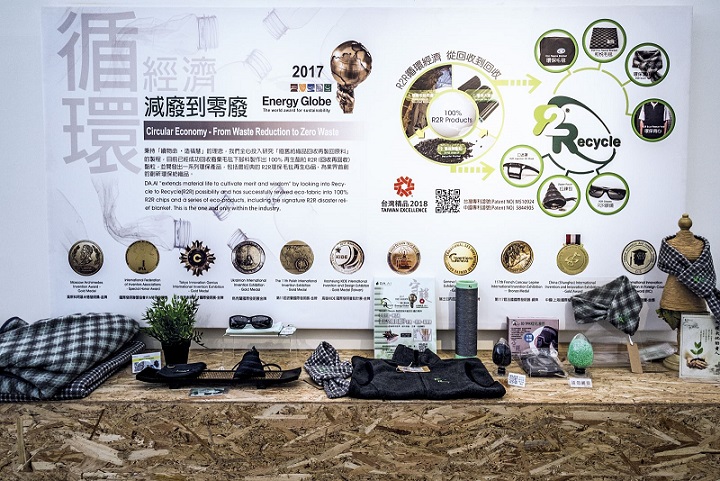
With the Recycle to Recycle (R2R) technology developed by Tzu Chi volunteers, products created from recycled PET bottles can be recycled again to minimize waste.
So, it is of critical importance to think of ways to reduce the use of plastic, prevent inadequate disposal of plastic waste, and increase its recycling and reuse rate. One of the specialties of Tzu Chi's environmental protection work is turning recycled PET bottles into thermal blankets that are handed out to people in need around the world. At Neihu's recycling station, where the fabric for the recycled blankets is cut and processed, there is a display area introducing the blanket-making process starting with collecting PET bottles, melting them into strips to make pellets, and spinning them into threads for weaving.
"The current temperature is 275°C. Please keep your distance! After we put pieces of PET bottles into the machine, they melt into polyester strips that are cut into polyester pellets. Then, we put the pellets in here so they are spun into strands of thin fiber. Can you see the threads?” The operator turned on a modified vacuum cleaner and carefully applied the suction head to pull the liquid polyester into seven strands of fiber thinner than human hair.
Thermal blankets are not the only products that can be made from recycled PET bottles. James Lee (李鼎銘), General Manager of DA.AI Technology, appeared before the visitors and said: “The clothes I'm wearing, including my shirt, tie, and trousers, are all made from PET bottles. Each one of us can reuse and recycle, converting waste into resources.”
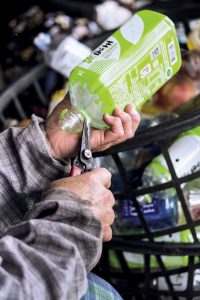
A recycling volunteer cuts the plastic ring from a PET bottle. Since PET bottles, bottle caps and rings are made of different materials, separating them and sorting parts of the same material together facilitates the recycling process.
Senior Volunteers: Experts at Recycling
Under the recycling station's corrugated iron roof, a group of volunteers—many in their 80s and 90s—were doing recycling work. In the paper area, 96-year-old Xu Ping (徐平) was focused on cutting paper to separate blank parts from the printed ones. Having worked at Neihu's recycling station for more than 26 years, Xu is dexterous despite being a nonagenarian, cutting and sorting paper swiftly.
In other working areas, there are many elderly volunteers like Xu, working quietly to sort and classify resources. In a corner, 74-year-old Li Jin-zhao (黎錦照) was dismantling discarded cassette tapes and videocassettes. “No one uses these tapes anymore,” he said. With a screw driver, he deftly removed the screws and separated plastic parts that can be recycled. Other items, such as broken umbrellas, can also be reused and recycled once the shaft, ribs, and cloth are separated.
Li Guang-yi (李廣義), another recycling volunteer, cut open the plastic covering of a document folder with an utility knife to pull out the cardboard underneath. After taking apart discarded items and sorting parts carefully, pieces of garbage that seemed useless can be transformed into resources to be reused and recycled.
The elderly volunteers working tirelessly in the recycling station can gain health benefits from the exercise as well as find joy and meaningful from the work they do. “Seventeen years ago, my wife joined Tzu Chi. I saw her transformation, decided to join her, and have been working in the recycling station since. I'm 92 years old now!” Li asserted energetically. Through working with care and inspiring by example, the elderly volunteers, with their dedication, friendliness and optimism, have touched the visitors and given them a picture of Tzu Chi's environmental efforts.
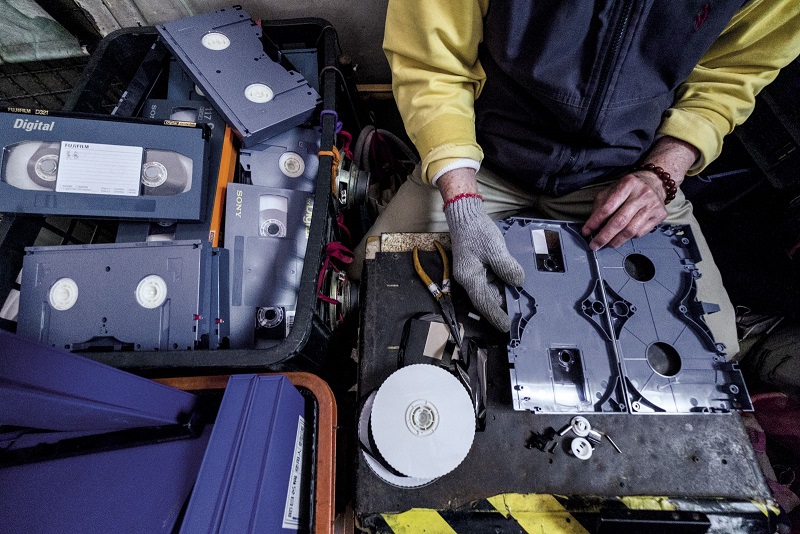
As video and audio data are now mostly stored on hard disks and servers, videotapes have been extensively discarded. A recycling volunteer takes them apart to recycle metal screws, plastic components, and other recyclable parts.
A visitor from Sichuan Province shared his thoughts during the visit: “In my mind, environmental protection is an immense and complex project. Just the thought of it scares me off. However, during this visit to a Tzu Chi recycling station, I have witnessed the possibilities of integrating mindful dedication and new technology to transform waste into resources.” He mused, saying that “we can use a thousand and a million words to talk about protecting our environment, but ultimately, we still need to roll up our sleeves and get to work.”
A senior executive from Shandong Province said she was moved by the tour. “An elderly volunteer who is also from Shandong heard my accent, started talking to me and asked if we have recycling stations in northeast China. I don't know if there are any, but after this learning experience, I'm willing to take an initiative in environmental protection when I return home.”
The leader of the visiting group from China, chairman Wang Rui-rong (王瑞榮), shared his thoughts on his experience of the tour. “In this recycling station, I've witnessed people working in line with a culture of mindfulness and environmental awareness. Tzu Chi provides the elderly, many of whom are over 90 years old, with a space that enables them to live their lives with dignity and grace.”
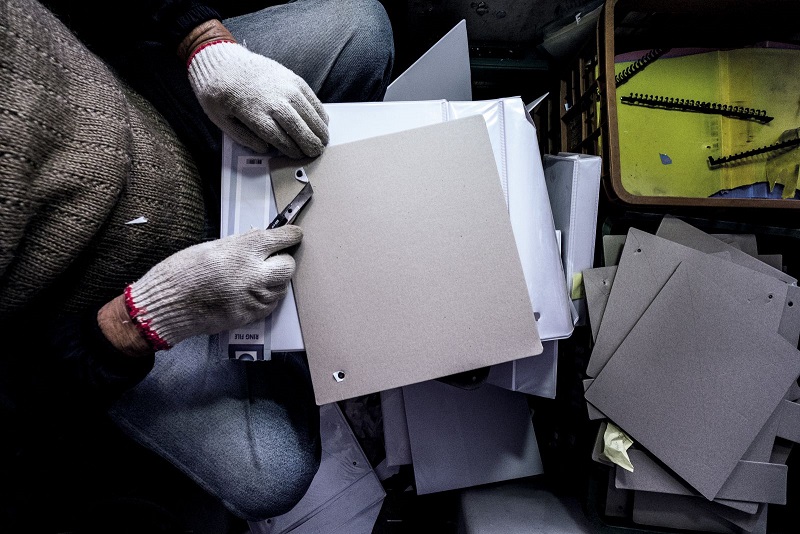
With a utility knife, a recycling volunteer cuts open a document folder to take out the cardboard inside to be recycled.
Regarding the global impact caused by China’s import ban of foreign waste in 2018, Wang opined that “global waste trade only exacerbates pollution. Whether the waste is shipped from the Americas to Asia or between any regions, the waste is still on Planet Earth, which is shared by the entire human race!”
As visitors keep coming to Tzu Chi's recycling station in Neihu to learn how to reduce, reuse, and recycle, Tzu Chi's recycling volunteers will continue to work towards minimizing waste, cherishing every resource, and showing by example that anyone can contribute and make a difference in protecting the environment.
Contact Us | Plan a Visit | Donate
8 Lide Road, Beitou 11259, Taipei, Taiwan
886-2-2898-9999
005741@daaitv.com
©Tzu Chi Culture and Communication Foundation
All rights reserved.
